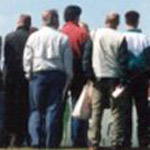 |
Communication and mediation
The activities of DARCOF must be conducted in dialogue with the producers, advisors and consumers. And in the centre, very different institutes and research groups must cooperate to produce results that can be used by the research and advisory systems for both organic and conventional farming. At the same time the acquired knowledge must be made available to different users and society in general. A key characteristic of DARCOF is therefore the different means of communication employed at the centre.
The institutes and researcher groups that take part in DARCOF's projects have different backgrounds for doing research in organic farming. Likewise, their traditions relating to the mediation and dissemi-nation of information are very variable. Several of these organisations publish their own newsletters, journals and reports, which are directed at specific user groups: advisors, veterinarians, companies, and others. Others follow more general, traditional channels for publishing information, such as agricultural periodicals, scientific journals, etc.
DARCOF's mediation activities is not to replace existing channels for the publication and dissemina-tion of scientific and technical knowledge. On the contrary, it intends to support the communication on organic farming in existing media. However, being a coordinating centre, DARCOF is able to pro-vide a more complete overview of the research, and it addresses a broader section of users groups. And it can offer participating institutes the opportunity to utilise the expertise and information channels of the centre.
DARCOF has thus instigated a number of activities, the objective of which is to strengthen the overall information input for research in organic farming. And here, the choice of appropriate communicative tools is essential in securing that the research findings and perspectives are communicated to the differ-ent interest groups.
Publications
DARCOF produces a Newsletter on Research in Organic Farming, has agreements on regular columns in periodicals and has also occasioned the preparation of information material like folders and posters, etc. The centre also offers advice and guidance to participating research groups with regard to commu-nication and dissemination of information and in relation to the organisation of meetings, workshops and conferences.
DARCOF has prepared reports about subjects within research in both Danish and English and assist in collecting and synthesising information in connection with authorities planning within the area of or-ganic farming.
Activities
It is important to provide opportunities for direct dialogue between research workers and farmers, ad-visors, public authorities, and other interested groups, as well as for interaction between DARCOF and the organisations with a stake in organic farming. For this reason DARCOF also organises field walks, theme days and public workshops.
Since 1999 "organic field walks" have been organised each summer, where interested groups are invited to visit the organic workshop sites, crop rotation trials, and the research farms at Rugballegaard and KVL. On the sites researchers have prepared information and talks on the research that takes place here. There is also room for discussing the findings, the methods and the relevance of the research.
Theme days on chosen subjects are intended to discuss current research and research requirements with an audience of researchers, advisors and farmers. Public workshops are often organised in connec-tion with knowledge syntheses as an element in the preparation of new research projects.
On a larger scale, DARCOF was one of five organisations behind the Organic Congress 2000 in Den-mark. The purpose of the congress was to take stock and set new goals for the organic movement. The Danish Organic Congress will be repeated on a biannual basis.
It should also be emphasised that DARCOF interacts closely with the relevant professional organisa-tions and NGOs with a stake in organic agriculture. This interaction occurs primarily through DAR-COF's User Committee.
|